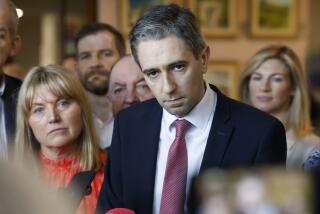Stakes High as N. Ireland Vote Nears
- Share via
LONDON — The hopes and prestige of two countries, Britain and Ireland, are at stake next week in an election in Northern Ireland aimed at ending decades of fraternal bloodshed.
As ever, passions are high and peace is a longshot.
At issue is the relative popularity of moderates and militants on both sides of the Catholic-Protestant divide--and the painfully agreed-upon policies of London and Dublin meant to push them toward the bargaining table.
A 110-member forum to be elected Thursday will name negotiators to seek a long-range political settlement for Northern Ireland, a six-county slice of the island of Ireland that is a province of the United Kingdom.
No matter who wins, everybody is a potential loser if Sinn Fein, the legal political arm of the terrorist Irish Republican Army, is not represented at the talks beginning June 10.
Britain and Ireland say Sinn Fein may contest the election but cannot take part in talks unless the IRA reestablishes a 1994 cease-fire it broke in February.
“Talks without Sinn Fein aren’t worth a penny candle,” said Fergus Finlay, an advisor to the Irish government.
The British government says that even without Sinn Fein, the talks will be useful in creating new political structures for a province ruled directly from London since 1972.
“Sinn Fein will not participate without a restored cease-fire. The threat of violence cannot be allowed to hold a democratic process to ransom,” Michael Ancram, a British minister for Northern Ireland, told foreign reporters here.
In a bid to join the conference, Sinn Fein leader Gerry Adams said this week that his party accepts six principles of nonviolence and democracy proposed by American mediator George J. Mitchell as an entry oath required of all parties.
Mitchell, a former Senate majority leader, also called for the gradual disarming of the IRA and Protestant terrorists as negotiations progress, a compromise reluctantly accepted by British Prime Minister John Major and unionist politicians, who had long demanded at least a token IRA weapons surrender before talks began.
“In the context of all-party talks, if the other parties sign up to the Mitchell principles, Sinn Fein will make our commitment absolute,” Adams said.
Not enough, say Britain and Ireland, strongly backed by the Clinton administration.
“There must be an unequivocal restoration of the IRA cease-fire,” William J. Crowe Jr., the U.S. ambassador to Britain, recently told a university audience in Belfast. “There can be no room at the negotiating table for those who seek to gain their objectives by other than peaceful and democratic means.”
Adams says he cannot guarantee a cease-fire, insisting that while his party speaks for the terrorists it cannot control their actions.
“We are not the IRA,” Adams has insisted time after time.
But like the British government, political parties representing the Protestant majority make little distinction between Sinn Fein and the IRA in their election campaigns.
David Trimble, head of the main Protestant group, the Ulster Unionist Party, says Adams convinces no one.
“Sinn Fein/IRA are part and parcel of the one organization, and for Sinn Fein to try to separate itself from the IRA would appear to be simply a sham,” said Trimble, whose party took 29% of the vote in 1993 local elections.
Trimble is a moderate compared to Protestant firebrand the Rev. Ian Paisley. His hard-line Democratic Unionist Party, which got 17% in the last elections, believes that nothing good can come of peace talks and is committed to the preservation of Northern Ireland’s ties with Britain.
On the Roman Catholic side, the moderate Ulster Social Democratic and Labor Party headed by John Hume supports Sinn Fein’s call for a reunited Ireland but has no patience for violence.
Like his counterpart Trimble, Hume, whose party got 22% in 1993, will be a key figure in volatile times ahead.
Which leaves Sinn Fein, which polled 12.5% three years ago. Adams says his party is committed to a negotiated settlement but has been repeatedly undercut by Britain and the unionists.
He insists that an electoral mandate should earn Sinn Fein a place at the peace table. But the longer the IRA threatens more violence, the lower Adams’ credibility.
“I am convinced there will be peace in my country,” Adams said. “What I can’t answer is when.”
More to Read
Sign up for Essential California
The most important California stories and recommendations in your inbox every morning.
You may occasionally receive promotional content from the Los Angeles Times.













